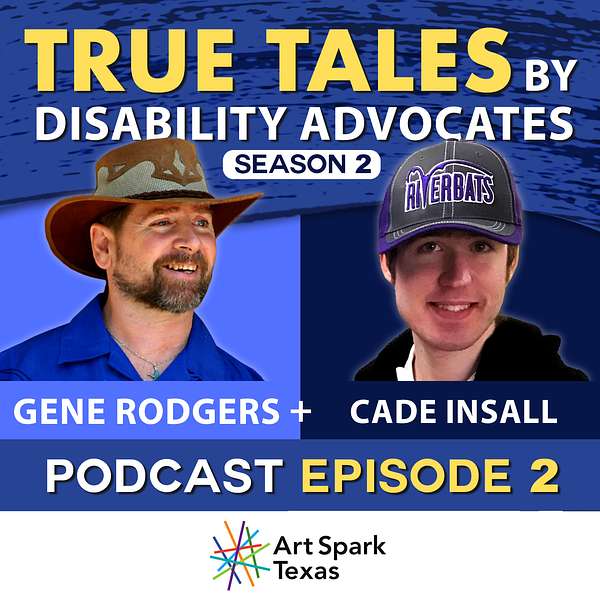
True Tales by Disability Advocates
Where advocates harness the power of storytelling to build community with their peers and hope to develop empathy in others. A team of disability advocates creates this True Tales podcast to share personal stories by disabled storytellers and add their voices to the growing community of podcast listeners.
True Tales by Disability Advocates
Kindness and Connections with Gene and Cade
Hosts Brittany Sessum and Kaye Love introduce storytellers Gene Rodgers and Cade Insall, who share stories about the ways they have used Kindness and Connections to transform their lives.
As we enter the holiday season, listening to “Kindness and Connections” brings you the courage you need to find hope and peace in your life, no matter the circumstances right now.
Guest - Gene Rodgers
As a wheelchair user, Gene Rodgers traveled in 44 countries, on 6 continents. Rodgers sailed on many types of ships on several oceans. He has enjoyed diverse recreational activities including skydiving, snow skiing, sailing, scuba diving, paragliding, and trekking in the Himalayas on an expedition to Mt. Everest Base Camp.
Rodgers worked in several states and earned a merit award for computer programming. Working full-time, and later as an entrepreneur provided funding for his adventures.
Rodgers earned several college degrees and a Switzer Fellowship. He did all this after becoming almost totally paralyzed at age 17, in a hiking accident.
Rodgers learned to thrive on all sorts of adventures. Put him in a country ten thousand miles from home, where he doesn’t know the language or culture, and he’ll feel quite comfortable.
My Memoir - AwesomeByAccidentBook.com
My web page - https://genosplace.org
My TV/Web Show - https://thegeneanddaveshow.com
Facebook - https://www.facebook.com/gene.rodgers.982/
Guest- Cade Insall:
Cade Insall is a Texan that loves to be around family and friends. Cade loves animation and making 3D modeling projects through Blender. Cade likes interacting with others and learning new things in his expression through art.
Host
Brittany Sessum is a Houston native and Army veteran who loves connecting with others. She has a passion to serve her family, the community, and her country by giving back in any capacity. She believes that her passions and actions live beyond herself. Brittany loves writing poetry, reading, traveling, and working as an entrepreneur.
Host:
Kaye is passionate about assisting individuals to explore and enhance their sense of meaning and purpose in life in a way that is sensitive to and respectful of their religious or non-religious understanding. She understands the challenges of developing an appreciation of a personal skill set that is unique, positive self-esteem, and creative work-arounds for functional limitations, as well as the difficulties involved in navigating education, employment, healthcare, and community organizations designed for those with typicality. Kaye has over eight years of experience working with individuals with developmental and learning disabilities, including Intellectual Disability and Autism Spectrum Disorder, in Special Education and Vocational Rehabilitation. She is experienced with providing spiritually sensitive counseling to clients who identify with diverse belief systems “Faith and Inclusion”
Website: kayelove.com
LinkedIn: J. Kaye Love, MSSW/MBA, LPC, - Austin, Texas, United States | Professional Profile | LinkedIn
Schedule Counseling onThrive:Thriveworks Counseling - Janet Kaye Love
For more details about our programs go to Art Spark Texas, True Tales Podcast Page.
Welcome to The True Tales by Disability Advocates. Authentic voices of people thriving with disabilities. Were individuals use the art of storytelling to change the world. True Tales by Disability Advocates podcast is produced by Art Spark Texas Speaking Advocates Program. Keep listening to hear how lives challenges can spark a desire to speak out and advocate for ourselves and others.
MsBoye:Welcome to Season two of True Tales by Disability Advocates. The podcast where advocates harness the power of storytelling to build community with their peers and hope to develop empathy in others. A team of Disability Advocates creates True Tales to give disabled storytellers the opportunity to share their personal stories and lived experience in their authentic voices. We offer our unique and often underrepresented perspective to the growing community of podcast listeners worldwide. Did you know that according to the CDC, one in four Americans are disabled? That's about 61 million adults with 61 million experiences and points of view about what it means to live in a world not designed for them. Recognizing that everyone's life is enriched by the inclusion of multiple voices, Art Spark Texas has been training Disability Advocates as storytellers for over twenty years. Episode two of this season,"Kindness and Connections" is being launched in November, 2022, which is Epilepsy Awareness Month, and we also recognize World Kindness Day, honor the National Day of Mourning and celebrate Thanksgiving. It is the month that Americans traditionally celebrate the things we are thankful for and are encouraged to express that gratitude. This year I am full of gratitude for the opportunity to be part of this podcast and to work alongside the amazing team of people who put so much hard work into creating each episode. As well as our listeners across the world who choose to click play for our little podcast. It's easy to be grateful for the gifts in our lives, but have you ever thought about being grateful for all the problems in your life too? About 30 years ago, a friend of mine told me I should read the book,"A Road Less Traveled" by the psychiatrist M. Scott Peck, who by the way, is not one of my favorite people, but that's a rant for another time. These are the opening lines of the book:."Life is difficult. This is a great truth, one of the greatest truths. It is a great truth because once we truly see truth, we transcend it. Once we truly know that life is difficult-- once we truly understand and accept it-- then life is no longer difficult. Because once it is accepted, the fact that life is difficult, no longer matters." I have to confess, the first time I read those lines, it made me so uncomfortable I immediately gave up on the book. It was a difficult time in my life, as I struggled with the chaos and trauma that inevitably accumulates in the lives of undiagnosed neuro-divergent adults. I could only understand those words through the fog of powerlessness and hopelessness of shame, anger, and self-loathing that surrounded me and that led me to believe that I was condemned to a life sentence of suffering. I am so grateful that these days I can read those words and experience them for the wisdom and comfort they offer. I think we have a tendency to expect that the gifts in our lives will come to us wrapped up in warm, fuzzy feelings, but that's not always the case. I am a great believer in the philosophy that says, no matter what we're going through, there is always a greater good acting in our lives. Now, don't get me wrong, this isn't something we can always see while it's happening and nor should we. In fact, some situations are so difficult, so awful to not feel mad, devastated, or even victimized by them would be more Vulcan than Human. We feel powerless because often in the moment we are powerless to change these situations. But in retrospect, I find once I reach acceptance of what is, grieve and begin to recognize what I can do, I can eventually find the gifts that came to me wrapped up in a package of pain and suffering. Gene Rodgers and Cade Insall, the storytellers in this episode are proof of this philosophy. Ice Cream Angels" by Gene Rodgers from his book,"Awesome by Accident," was an obvious choice for this episode. Host Brittany Sessum chats with Gene about their experiences traveling the world and the power of kindness to build connections beyond culture and language. After becoming paralyzed at age seventeen in a hiking accident, Gene struggled for years with the reality of his new life. He shares, how he was eventually able to shift his perspective and open his heart to unexpected encounters. Since then as a wheelchair user, he has traveled in forty four countries, on six continents. Thriving on all sorts of adventures Gene enjoys skydiving, snow skiing, sailing, scuba diving, paragliding, and even trekking the Himalayas on an expedition to Mount Everest base camp! He finds kindness in the form of"Ice Cream Angels" in the most unexpected places. Our second storyteller, Cade, tells of his commitment to move beyond what he felt were the limitations of his Autism diagnosis. With the help of coaches and teachers, he is learning to make connections and build friendships. He dreams of pursuing a career in 2D animation and will use the skills he has learned from his coaches with his new employers, to share with them the gifts of his Autism, as well as expressing his concerns as they come up and asking for help when he needs it. Host Kaye Love chats with Cade about his journey and his big plans for the future. Kaye is a passionate advocate for epilepsy awareness. She will be sharing her journey to acceptance and self-kindness in the next episode. You can also listen to her story,"Faith and Inclusion" in Season One. The link will be in the show notes for this episode. As we enter the Holiday Season this year, may listening to"Kindness and Connections" bring you the courage you need to find hope and peace in your life, no matter the circumstances you are dealing with right now.
Brittany:Welcome to True Tales by Disability Advocates, changing the world one story at a time. I'm Brittany Sessum, and I'm your host. Our first storyteller, Gene Rodgers shares his story,"Ice Cream Angels", highlighting cultural acceptance, disability, and acts of kindness. Hi, Gene Rodgers! Welcome to the show.
Gene:Hi, Brittany. Thanks for having me.
Brittany:You're so very welcome. I'm very excited for you coming on the show with us today. So Gene?
Gene:Yes.
Brittany:When I first thought about your title I actually thought of the complete opposite, which is like what people call a snow angel, because that is a term that many people know. In which a person uses their body to make an imprint in the snow. Growing up in Houston, Texas, there was not that much snow, but I still tried to make one on those thin layers of snow that we had back in Houston. Those imprints tell a story of something that once was there, but you have me intrigued about your title Ice Cream Angel", can you tell our listeners when and why you wrote it?
Gene:Sure Brittany,"Ice Cream Angel" is a piece that I wrote for a live performance group called Actual Lives. Actual Lives was composed of people with, uh, all sorts of disabilities. We would write short, stories about events in our lives, and then we would perform them on stage. This way we gained speaking skills and learned what it takes to get someone's attention to, um, further our advocacy skills. So this was very helpful in, uh, other areas of our life. The piece I wrote,"Ice Cream Angel", is a true story of something that happened to me in Juárez Mexico. And I wrote it because, um, this person really touched my heart. A little girl, uh, who I thought(laughs) was an angel. When I think of Angel, I think of, um, uh, uh, a Bright Spirit or, um, really, um, mesmerizing figure that that could, that, that's just wonderful. And I was just happy to be able to share it with other people. As I read the story, you'll see why I call her"Ice Cream Angel". So if I may, I'd like to read it to you now.
Brittany:Okay, Gene, before we get to your story, I just wanna say, thank you very much for giving your reason why you wanted to write the story, cause because some people, they usually write stories that mainly about themselves, but you're, you're writing about a person that have impacted your life in a positive manner.
Gene:Absolutely.
Brittany:It's so great that you used it for advocacy, because the way you wrote"Ice Cream Angel," it kind of touched me as well. I write poetry, not only do I want to be impacted because I wrote it but it's also good when you're, when you have an audience that's engaged by what you wrote and they can feel the passion that you put into, um,"Ice Cream Angel" That's what we want to do. And so I just wanna say, you know, thank you. Um, it's a very good treat that our listeners are about to hear. So, please share your story with us.
Gene:Thank you, Brittany. My name is Gene Rodgers and this is my story,"Ice Cream Angel". As usual, I was out of town on holiday. This holiday, however, would be far from usual. It was a warm, sunny Easter Sunday in Juárez Mexico. I sat in my wheelchair on the plaza in front of a large church. My friends Patrick, Debbie, and I wanted to attend Easter Sunday services, but there were too many steps to get into this church. Rather than have my friends carry me in my wheelchair up the steps, I told them I would just wait outside for them, soaking up the sun. I don't know how long I was sitting there observing all the Easter decorations, all the people wearing their finest Easter clothes. The vendors hawking everything from flowers to ice cream. The mariachis rounding out the ambience. My casual observations were interrupted by a little girl, perhaps no more than six years of age. She was holding an ice cream cone and saying something to me in Spanish. I couldn't speak Spanish then, and it became clear she didn't speak English. I regretted not studying Spanish in college. Science majors were encouraged instead to study German. Besides, growing up in Cleveland I was among more German speaking people than Spanish. I wondered what were the chances of this little girl speaking German. she held up the ice cream cone gesturing to me I think she wanted to hand it to me I used my best sign language to indicate I couldn't use my fingers or my hands This persistent little tyke wouldn't give up. She held the ice cream cone up so I could lick it. Then she took a turn licking it. Every time she offered up that cone of goodness, I could sense the innocence and love behind those big brown, beautiful eyes. We took turns sharing that ice cream cone until it was all gone. When we finished the ice cream cone, my"Ice Cream Angel" disappeared as mysteriously as she appeared. That Easter Sunday, a child and I shared something more than an ice cream cone. She touched my heart in a way I've never experienced. I don't know if she remembers that day, but I know I'll never forget it. Since then, I have used the term"Ice Cream Angel" to describe any refreshing person, situation, or event that gives me a revitalized perspective on life. Thank you.
Brittany:Welcome back. I'm here with Gene Rodgers. Thanks for sharing your story with us today. Gene, you spoke on the child's innocence and love that you sensed. What new perspective about life did you learn from the ice cream angel?
Gene:Well, Brittany, you know, this person didn't know me at all, but she could see that I was at somewhat of a disadvantage. I was in a wheelchair. I couldn't really move the chair. I, I couldn't grab hold of the ice cream cone she wanted to give to me but she wanted to do something good. She wanted to offer something to me and without any expectation of getting something in return. And my gosh, you just, you just don't see that kind of thing nowadays. Um, I, I could have sat on that plaza a thousand years and that would never happen again. So, um, I was just really touched that somebody would do something that nice
Brittany:That's very beautiful. And so, when you had wrote your story, and even listening back to it again, I was thinking about a time when I went to China. When I went to China, I seen a man, in front of the forbidden city and he had half of his body, um, was, was cut and to stand up, he stood up on like a board with wheels. And to move around he had some hammers that he moved, um, so that he could move his arms to, to kind of skate himself throughout the road. And one of the things that even though he was asking people for money, one of the things that kind of caught my eye, which kind of brings me... helps me to think about this story, is the type of smile that he had, of looking beyond where he was, not feeling sorry for his self and his, his smile was infectious. To the point of I asked him if I could take a picture, not for exploitation, cuz I never put it on social media or anything like that. But I took a picture because that's a moment in time that you can freeze and that you can go back and look to. And just like your story, it's a picture in a sense with words because you used this story from a time, way back, um, to show your appreciation for someone that that meant so much to you. So when you use the term"Ice Cream Angel" in your story to describe any refreshing person, situation, or event that gives you an a revitalized perspective on life? Have you ever had any other instances when you considered other people to be an"Ice Cream Angel"? If so, what was your experience?
Gene:Sure. Brittany. Um, let's say for example, when I was in, uh, Puerto Rico, uh, I stayed at a, uh, Airbnb there. Um, an Airbnb is like a bed and breakfast. And the way it works is the, the owner wants to screen people very carefully cuz he doesn't want any troublemakers on his property. And I didn't wanna answer a whole lot of questions, so I just sent him the address for my webpage. Well, that was enough for him to be impressed that he allowed me to stay there. But then he also forwarded that address to a friend of his, a woman named Dilca. Well, Dilca decided she had to meet me. I didn't know who Dilca was, all I knew was I wanted to get started, uh, exploring the island. But I waited for Dilca to come over and my goodness, this, this woman was something else. She was, she was like an ambassador to Puerto Rico. She, um, was, was beautiful and kind and compassionate. We, we had a wonderful conversation. I told her where we wanted to go and she told us,"Oh yeah, I've been there. I can show you this and that." And after a while I said,"Well, Dilca maybe you can join us for, for some of our travels?" And she just looked and said,"Sure, why not?" So Dilca in her wheelchair, Um, joined us for some of our travels. My friend Brian, um, lifted her up, put her in the van, and then, uh, did the same with me, put our wheelchairs in the van, and, uh, off we went. But, uh, it was such a refreshing experience. I had absolutely no idea something like that would happen. Then there was another time, uh, a little girl, Katie. I met her at a church picnic. She kept looking at me from afar and she told her mother she wanted to meet me. So her mother brought her over to me, um, introduced us. We chatted for a bit, and then she went away. Then her mother came back and said,"Katie would like to visit you. Can she do that?" And I, I said,"Well, sure. I, I don't know what we would do, but yeah, that's fine." I, I should mention too, uh, Katie is deaf. They had moved to Austin from Houston because Austin has a pretty good school for the deaf. Now, Katie's father couldn't find work here in Austin, so he stayed in Houston. Um, so Katie would come over to my place and we, we would find things to do. Uh, at one particular moment we ran out of things to do, but I had a plate of cherries on the table. So even though I couldn't really use my fingers, I can wedge a cherry between my fingers and pick it up and put it in my mouth. So I ate the flesh of a cherry. Then I spit the pit out at Katie. She was really surprised. Then I did it again. That's when she realized it was a game. So we just took turns spitting cherry pits at each other. And, and it was just so much fun to be able to interact with someone. She later told her teacher, at the Deaf School that I'm her other Dad. I was really touched by that. So yeah, there, there are a number of other times I just, um, I I should make a collection of"Ice Cream Angel" stories. Oh, by the way, when her father did come to Austin, Katie got some cherries and she spit a pit out at her, her dad and her dad started yelling at her, and Katie said,"But Gene likes it!". laughs)
Brittany:Thank you so much Gene, really good stories about, people that have been another version of, of a"Ice Cream Angel" to you. And so those were some very sweet moments, um, that you just described.
Gene:Yeah. Thank you, and I would encourage everyone to travel and to meet people, be open to, to all sorts of things. Um, like, like in my case, I didn't know sign language um, and Katie was deaf but was still, I was open to meeting her. We got along fine. So just when an opportunity presents itself, take it. You'll, you'll enjoy it!
Brittany:You reminded me of that, that famous quote, carpe diem, seize the day!
Gene:Yes.(laughs) Thank you. Yes. That's it. Exactly!
Brittany:So you have a book called"Awesome by Accident." Can you tell our listeners what your book is about?
Gene:Yes, thank you, Brittany. The book is"Awesome By Accident." It's my memoir. It starts when I was seventeen years old. I broke my neck in a hiking accident and became totally paralyzed. So for a number of years, for 50 years I struggled. I mean, I really struggled until I finally found my place in the universe, so to speak. And, err, I had so many wonderful experiences and wonderful friends. I was compelled to share that story with other folks. Particularly people with disabilities. So I started, and it took me about a year to write it. I used a, um, mouth stick to type it, letter by letter. And, um, so I, I made a few mistakes, but um, overall it was a wonderful experience for me and I got a lot of good feedback. So I'm pretty happy with it. And really the, the underlying message in that book is personal responsibility. All of us have some sort of trauma or trouble that comes into our lives, and it's at that moment we have to decide what we're gonna do. Like, Roy, in the movie Tin Cup, played by Kevin Costner, when a defining moment comes along, you've got to define the moment or it defines you. In my case, I decided I'd better work the hardest I can in rehabilitation to further my life. Now this happened, I broke my neck in 1972, this was before personal computers, so I had no idea what I would be able to do in terms of studying at school or later on getting a job, because there no one could even describe a personal computer. But I kept trying, working the best I could and when I tried just to do the best I could, people called me awesome! And one editor, editor I had said,"Oh, you're so awesome. You're so awesome." And I eventually decided that would be a good title for my book,"Awesome by Accident." So you'll find a, a number of stories in there, um, and you'll learn all about my friends. It's on sale at just about everywhere books are sold. There's even a PDF and Kindle version, electronic version on Kobo. So, if you have any questions at all where to get it, go to Awesome by Accident book.com and that page will list everywhere you can get the book.
Brittany:Thank you so much Gene and I love that quote that you stated about not letting the situation define you. And speaking of, um, defining you what our listeners don't know, but if they do go to Awesomebyaccident.com, they will see the cover photo of your book, which is a picture of you...
Gene:dangling!
Brittany:Just hanging from a mountain, which is very awesome because this goes to show that anyone can still experience climbing a mountain. Having a mountaintop experience. You don't have to stay in the, in the low valley of a, a dark place or anything like that. You can always have a mountaintop experience where you overcome obstacles, and I think that the cover of your, your book truly defines, um, you Gene, like you continue to persevere. I've seen the, the clip of you, in your YouTube and I really like that video,"Dear Wheelchair Maker," where you're jumping out of the airplane, you're on a boat. And you know, this is very encouraging because some people might think,"Hey, I'm in a wheelchair. I can't really go that many places. I can't really do anything." But one of the things that most people may not have tuned into on your story is you stated in your story that every holiday you're not at home, you're always out and about. And one of the things that I would like to ask is when a person wants to travel with a, a wheelchair what are some of the things that they would need to do to prepare? And when I say that to prepare, are they looking for people that know how to plan trips or are you planning your own trips?
Gene:I plan my own trips, Brittany. I would say one of the most important things you could do is get a travel buddy that's easy going, that's flexible and could roll with the punches. Because there are so many times something happens and you're gonna need to go to plan B and you better have someone with you that is gonna relax and say,"Alright, we got this now." There were times, I mean(laugh), like I was on a plane, international plane somewhere, and I had a problem with my bowels and um, they let loose while I was on the plane and when it was time to change planes, I knew I had to take care of that but I only had one attendant with me so we had to recruit someone in the bathroom, some international bathroom at the airport. For some people that might end their travel, um, aspirations, but it's just, just part of the game. Just part of life. So, um, you keep going on, keep moving forward. And then you've gotta realize too, people in other countries have different ideas of accessibility. So if you call or write someplace and ask for an accessible room, and they say,"Sure, we've got one." Then you show up and it's not at all accessible laughs). It's just because people have different perceptions. So you have to anticipate being able to adapt to different situations Oh, and learn how to be careful traveling with medications. You don't wanna be caught like the young, uh, American basketball player and she had some items that, uh, weren't permissible in Russia, and so they have her in jail. So you gotta be careful what you bring. Bring prescriptions with you in addition to the medications. Put all that in your backpack because hopefully your backpack is going with you everywhere. If you put that stuff in your luggage, it's... It, it should not surprise you if your luggage gets lost or stolen. So you have to anticipate everything, everything that can possibly go wrong. Because it will.
Brittany:Thank you Gene And you're so right you have to roll with the punches. You have to be prepared for anything. And I know from experience, um, with my service that you have to be prepared for whatever comes, everything is not gonna be sunshine and rainbow and go perfectly, um, as you have planned it to go. You have to allow yourself to have accept some type of error or something to go wrong, but don't have the mindset that it will always go wrong or always go badly. If our listeners would like to reach out to you, how can they find you?
Gene:Um, Brittany, the best way to reach me is my email. It's U S A G E N O at gmail dot com.
Brittany:And then also, I know that you have a couple other social, um, media platforms, https://genosplace.org/. You also have the Gene and Dave show.com and you could be found on Facebook, Gene Rodgers 9 82. Then lastly, on YouTube just by typing in Gene Rodgers, and then you'll be able to see more in depth, the video that I was talking about, the"Dear Wheelchair Maker." And so Gene I just wanna just tell you again, how much I appreciate you taking your time out to be with us today.
Gene:Thank you, Brittany. It's been a pleasure. I had a great time. Thank you for, uh, including me.
Kaye:I'm Kaye Love and our second storyteller is Cade Insall here to share his story,"Autism and Self Imformation." I'm excited to speak with him today and to hear his story, so welcome Cade.
Cade:Hi, I'm excited to be here.
Kaye:Great. Before you share your story, please tell us a little bit about yourself.
Cade:I go to school and then I go to a program called SELF, to be Independent and to work well with others. I go to training school called nonPareil and I'm taking the art track. I'm from Austin. I enjoy building with Legos, and the last thing I made was a space station.
Kaye:Oh wow, that's cool! So it sounds like you have a lot of exciting things going on. So now please share with us your story.
Cade:So my story is called"Autism and Self Information." When I was back in middle school and high school, I had trouble with communications because I have trouble saying what I need to say to others about like solving problems and also I need to figure out how to ask people for help. During my ninth or 10th grade year in high school, I went to a program called Autism Spectrum, that is a community for people with disabilities to help one another and to communicate. During Autism Spectrum I was sitting in a room with a couple students named Cameron and my previous language arts teacher, Ms. Sour. We have social disabilities, and the room was not too loud and not too quiet, because we were in two groups. In SELF, a transition program for young adults with disabilities had more students and more interaction than Autism Spectrum because Spectrum had students still in high school who need help with their problems to make their way towards graduation. During my class time, I went to Mr. Miller, I started to talk about how I could speak up to others, and this was my first step at communicating. I also talked to my speech teacher named Ms. Gonzalez because I needed help to work on my voice when it's time to talk to the class. During my year in SELF, I needed to learn how to manage my life as an adult whenever I'm on my own. So the first step I did in SELF was meeting new students and playing social games to have fun, but also to learn about each other. The second step I learned at SELF was communicating to the job coaches to get some help whenever I'm working. The last step I learned Excel was how to communicate in an ARD meeting for big plans coming soon. For example, I want to pursue a career in 2D animation. Now I'm confidently asking for help through communications whenever I'm confused at a task I don't know. Those experiences of striving to break my boundaries has helped me to stand where I am today. I once thought my weakness was communicating due to Autism. Now I know my strength is Autism because I learned how to build interactions with people by using my Disability as a topic.
Kaye:Thank you for sharing your story with us Cade. It sounds like the SELF program helped you with learning to make friends. I'm wondering how you have used what you learned to continue to grow your circle of friends.
Cade:Well, I got to meet the new people first and then I got to know them about their, uh, past in high school and also, uh, we played a special game to get to know each other better.
Kaye:So it sounds like it helped you with kind of learning how to make friends. In your story, you talked about learning to communicate with your job coach. Can you share a little bit about your work?
Cade:So I started to, uh, set up a time with my job coach to help me practice, uh, an interview whenever I need to meet with a manager or also a, an assistant one too, to a know what my task would be.
Kaye:That sounds great, it helped you to be successful with your job. You talked about learning to participate in creating big plans for yourself. What are those big plans?
Cade:Well, I uh, I intend on, uh, finding a job where I'm gonna be making characters come to life through a site called"Blender."
Kaye:Okay. So what kind of characters are you making?
Cade:I kinda made the, the model ones through, uh, the class task actually. I'm making a modeling characters like the Klaint robot. And also I made the car model too through"Blender."
Kaye:Oh, that sounds very creative and an exciting career path. Um, what do you hope the audience will take with them from your story?
Cade:I'm hoping that they, uh, take some time to look at, uh, how"Blender," uh, can make these characters. Also, uh, it can teach them a lot, how they can, uh, make certain objects come to life whenever they're interested of working in a company or studio or also, uh, gaming.
Kaye:So you'd like them to kinda look at what they can do and, and move forward for themselves.
Cade:Yeah, well, I think this is just, uh right.
Kaye:That's great advice. Thank you for sharing with us today. Good luck with all of your big plans.
Cade:Thank you. And I hope you enjoy your path too.
Kaye:Thank you. And if you would like to know more about Cade's Graphic Art, you can see it using the link in the show notes below.
Cade:Right, see ya. Take care. Uh, see you Brittany, Kaye and Jennifer.
Brittany:Thanks for listening to True Tales by Disability Advocates.
Kaye:I'm Kaye Love and I'm your host.
Brittany:I'm Brittany Sessum and I'm your host.
Kaye:This show was produced by Brittany Sessum
Brittany:and by Kaye Love, The production team also includes Kamand Alaghehband
MsBoye:And Jennifer McKinney.
Brittany:Thanks to our storytellers for coming on the show today.
Kaye:I also want to give thanks to our guests for taking time out of their schedules to be with us. Special, thanks to MsBoye for editing and mixing.
MsBoye:Thanks for listening to"Kindness and Connections." We hope you have enjoyed entering the worlds of our storytellers and that maybe you gained some insight for yourself. If you heard your personal story reflected in their stories or were touched by the content of this episode, we'd love to hear from you. You can share your stories and comments on our True Tales Podcast Facebook page. If you'd like to hear more stories like this, season one is available at Art Spark Texas dot org/ True Tales podcast or on your favorite podcast platform, we're on'em all. Look out for updates about season two and bonus episodes by following Art Spark Texas on Facebook, Instagram, TikTok,and Twitter Please share us with your friends. Thank you for your support
Kristen:All episodes of the True Tales by Disability Advocates are free on Apple Podcasts, Spotify, and anywhere you get your podcasts. This program is funded in part by a grant from the Texas State Independent Living Council, The Administration for Community Living and individuals like you. To learn more about The Speaking Advocates Program, sign up for our newsletter at ArtSparkTexas dot org. That's A.R.T.S.P.A.R.K.T.X. dot O.R.G. This free virtual training program is open to people of all disabilities, no matter where you live.
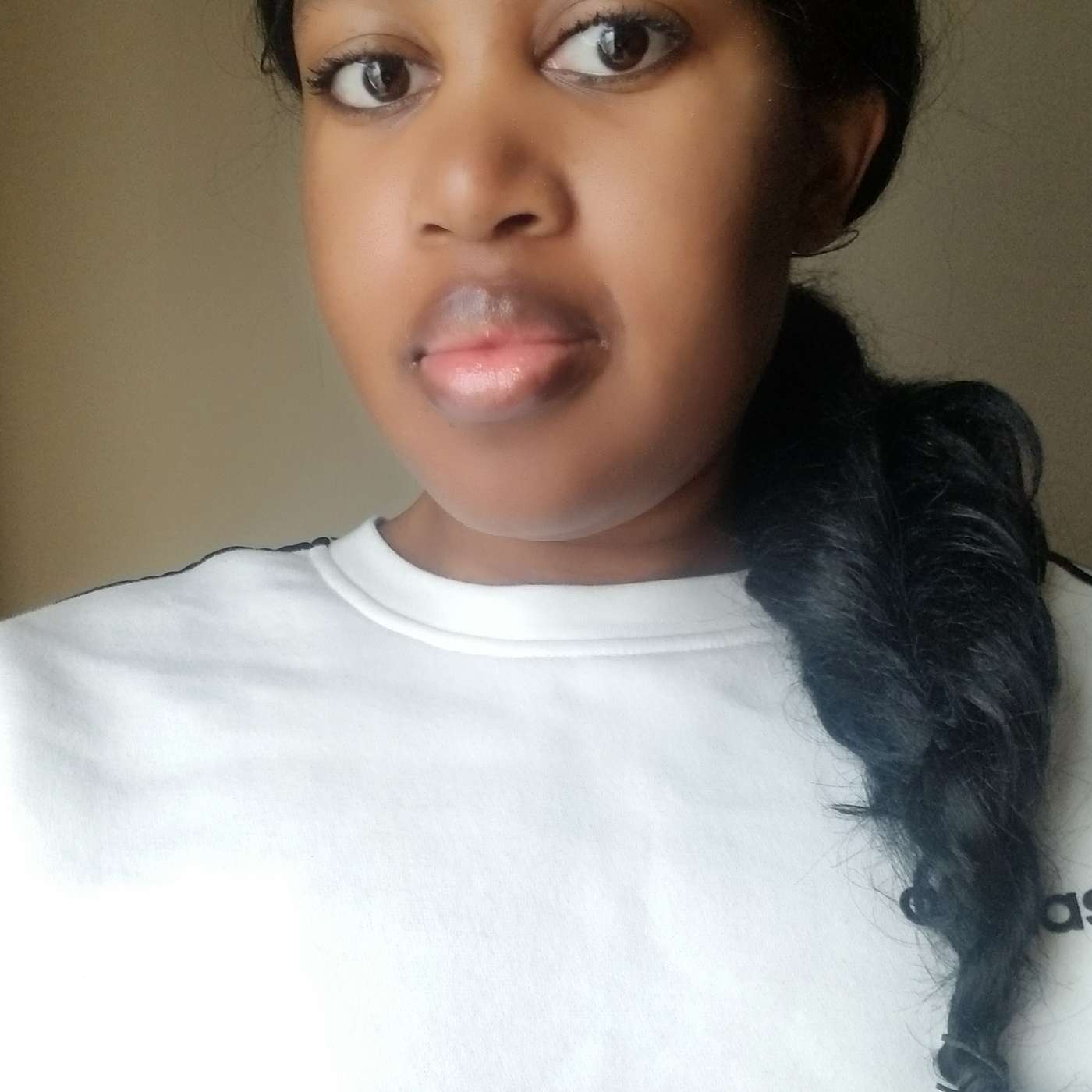
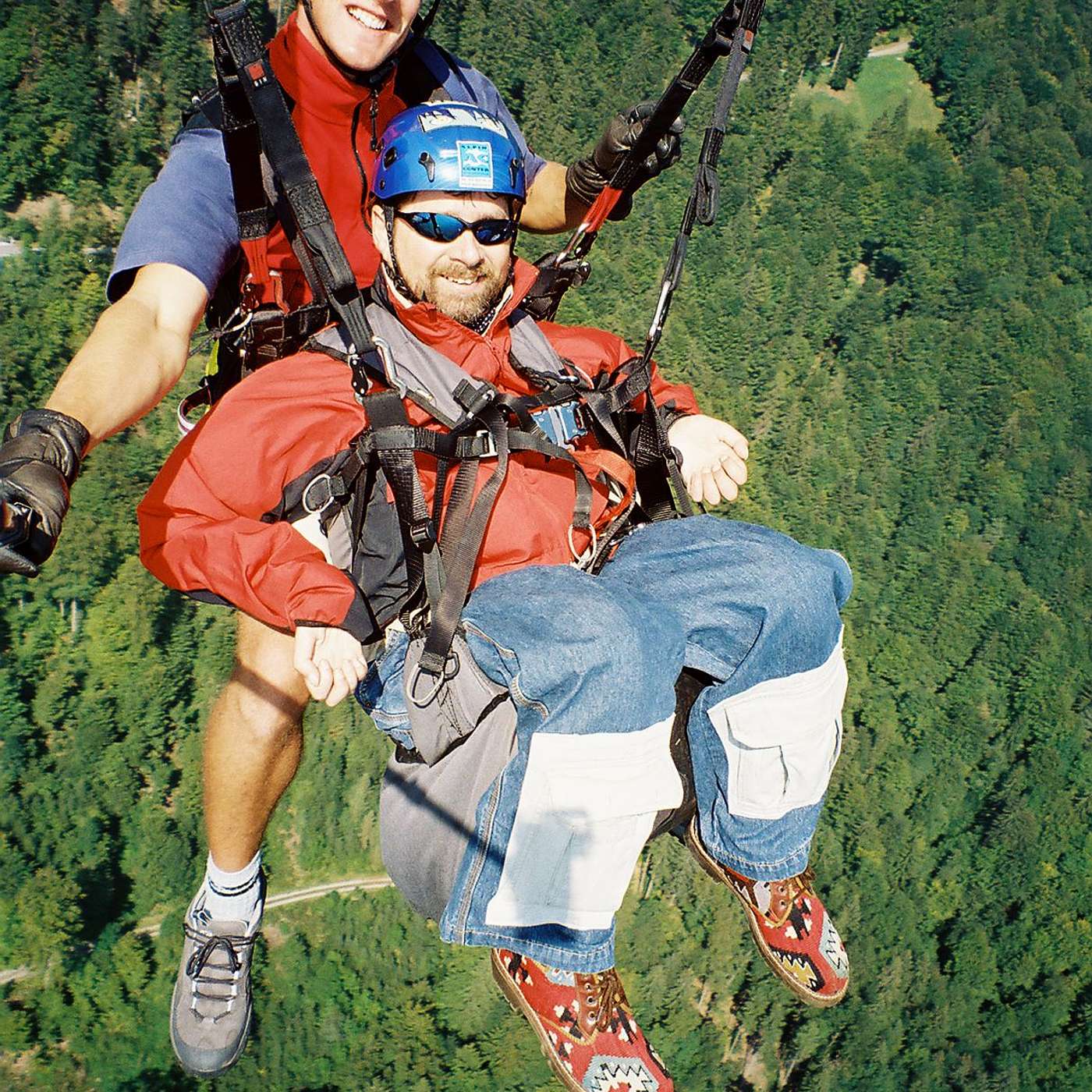
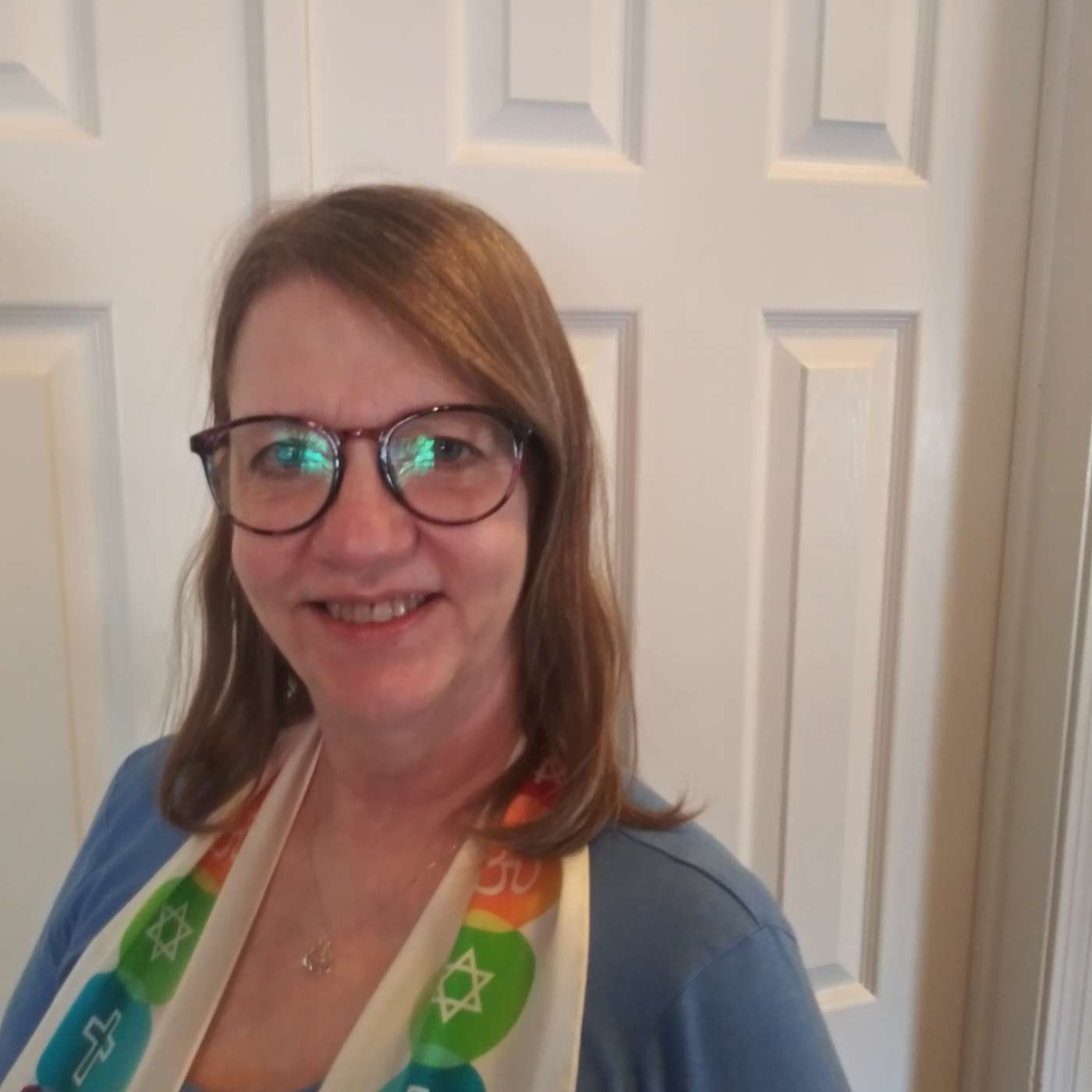
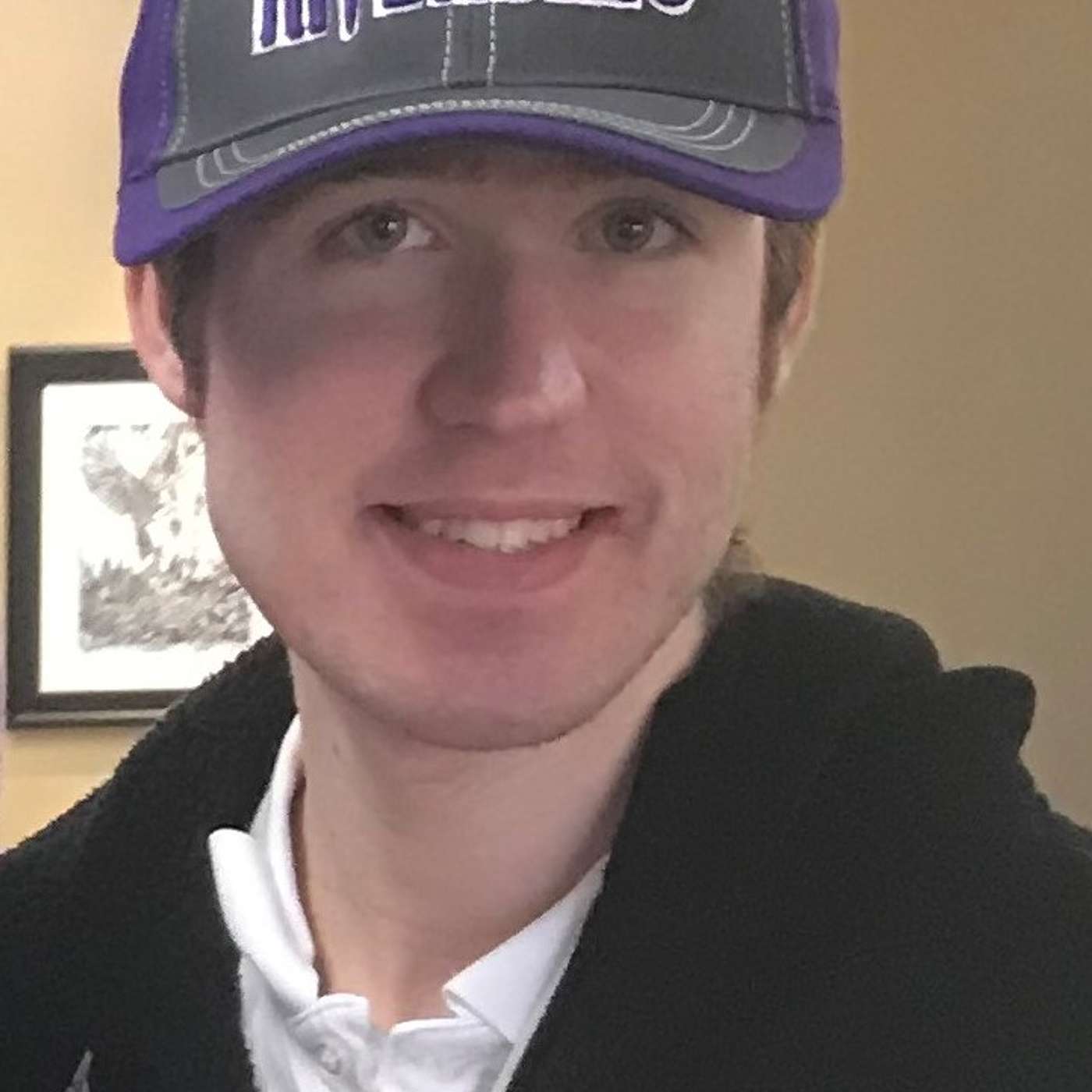
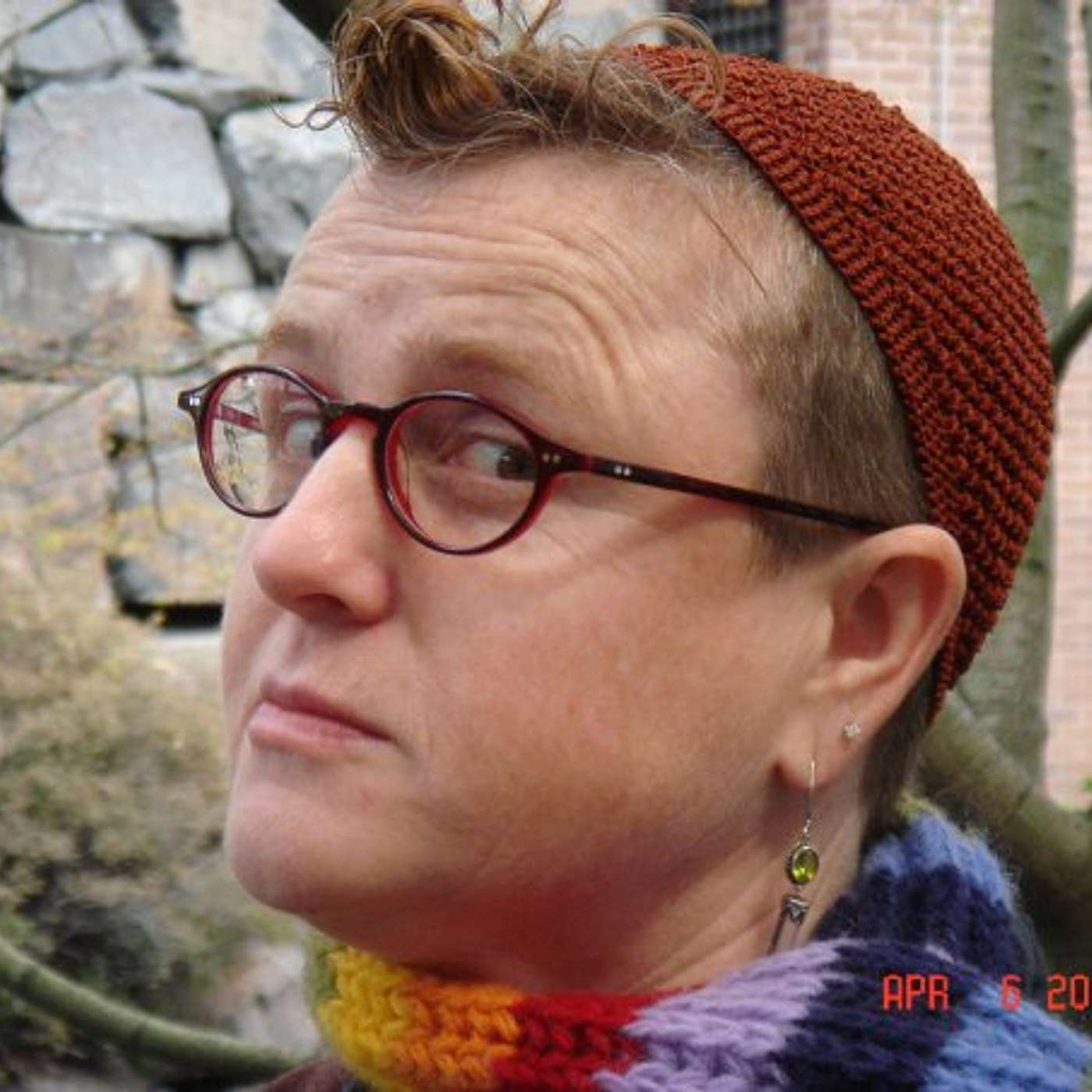
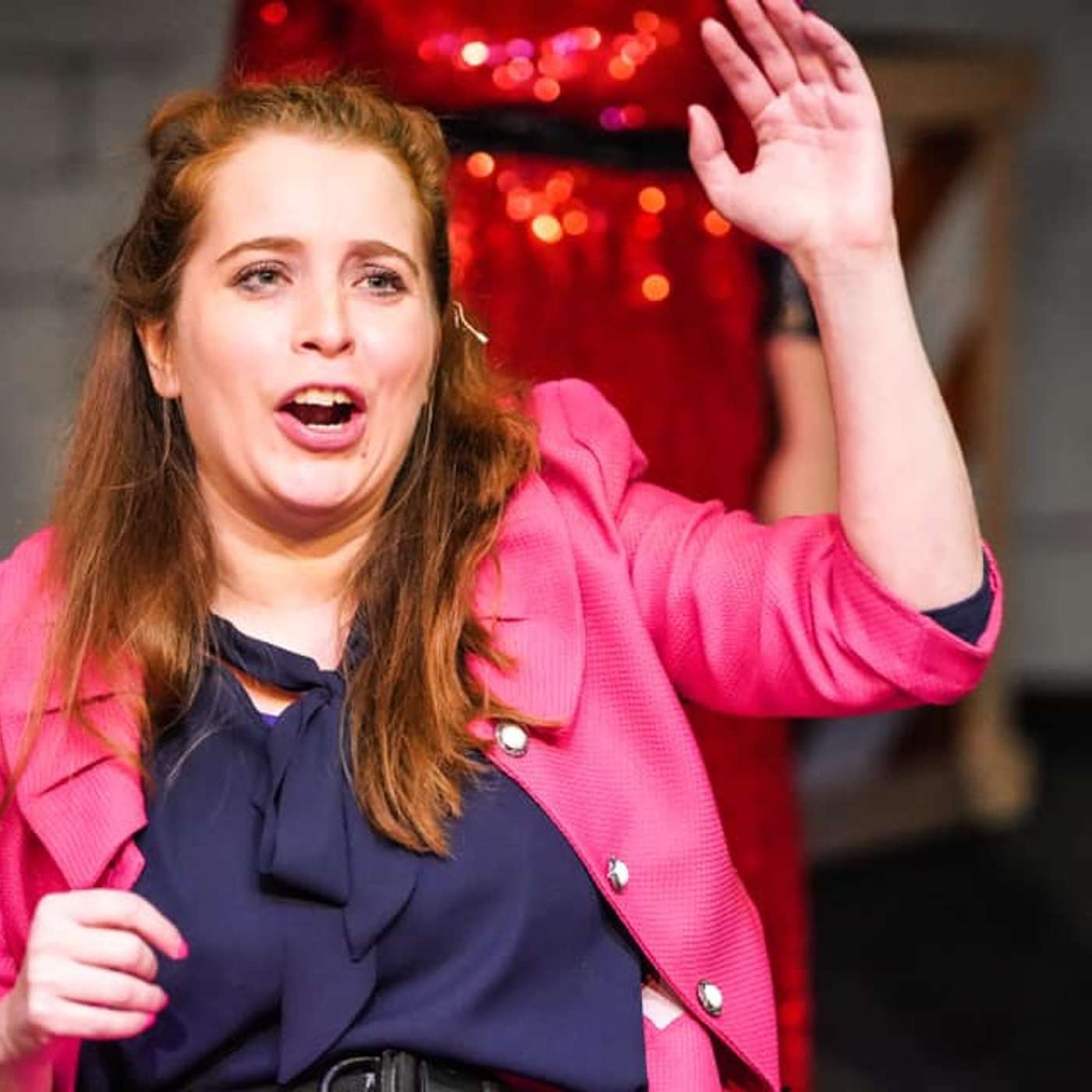


.jpg)







